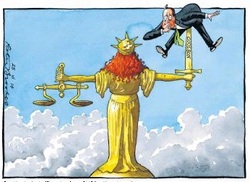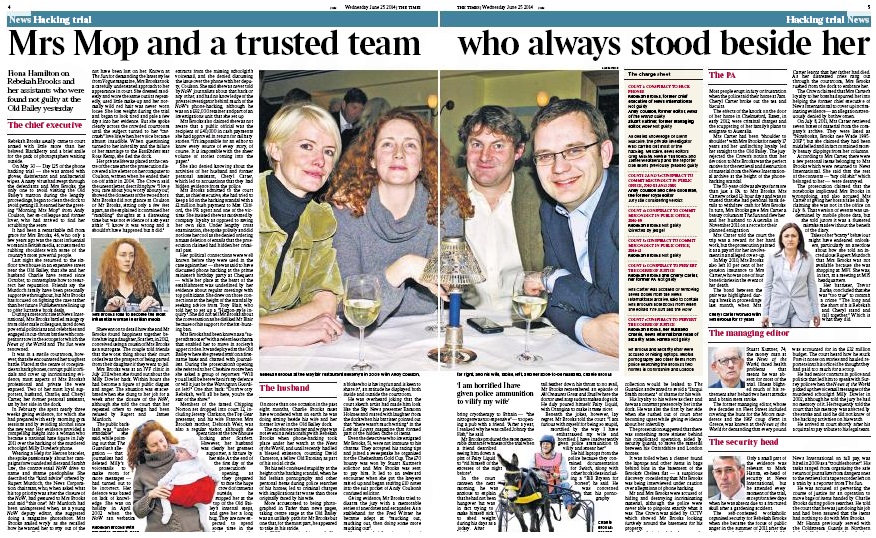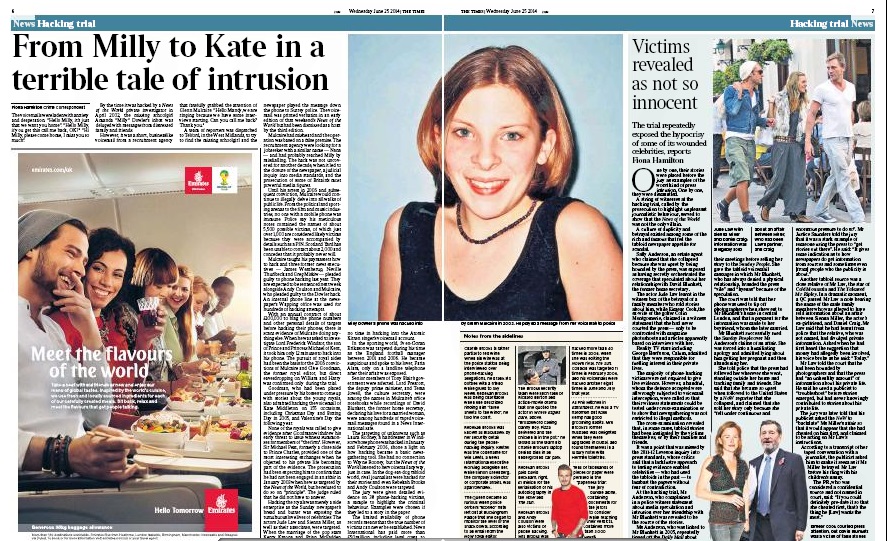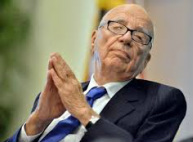The hacking trial: press coverage
The TimesWednesday 25 June, 2014
The Times not only headlines its splash "Brooks not guilty", but lays overwhelming emphasis on the acquittal in the text, not mentioning the Coulson conviction until the fourth paragraph or the Cameron apology until the sixth. There are rather more adverbs in the story than you might expect in the Times of from Fiona Hamilton; it has all the vested-interest subtletyof a story that has been worked on, dictated or, at the very least, influenced from on high: "Rebekah Brooks was cleared of any wrongdoing in the phone-hacking scandal that led to the closure of the News of the World when she was found not guilty yesterday of involvement in three alleged criminal conspiracies.Mrs Brooks, 46, the former chief executive of News International, walked free from the Old Bailey after a jury unanimously absolved her of any involvement in phone hacking and rejected the notion that she was a key architect of an era of journalistic intrusion. "Cleared of any wrongdoing", "unanimously absolved of any involvement", "rejected the notion that she was a key architect..."
This is all propaganda. She was cleared by the normal system of unanimity in the jury room. End of. After this opening flurry, Hamilton is allowed to get on and tell her story without frills, but they return towards the end: "The jury, however, roundly rejected the police and prosecution claim that Mrs Brooks, a former editor of both the NoW and The Sun who became a public hate figure, was at the heart of the wrongdoing." The inside coverage starts on page 2, a classic sign that the paper regards the story as being of overarching importance. Usually, even with the biggest stories, the inside coverage is deferred to pages 4 or 6 to give the reader a break, and get in other important issues - and even a lightener - before knuckling down to the main topic of the day. This time we are straight in for three spreads and nothing but phone hacking until page 8
The lead on the first spread is straight out of the pop lexicon in that it is essentially "Rebekah's ordeal", a background rather than live piece. This is surprising, given the very live news story surrounding the Prime Minister and Coulson. SubScribe would have expected that to side of the story to have dominated the first spread. Instead, it is the secondary element. [It is important to remember, however, that the jury had yet to reach its non-verdict on Coulson on another charge and so the laws of contempt applied, restricting what could be written about him.] Silly quibble: headline saying Brooks walks free over a picture of her in a car. The second spread is again about the cleared defendants and is an absolute joy. There is a warmth in Hamilton's writing (she was responsible for the splash and six inside pages) that allows her to project the human characteristics of her subjects without taking sides or showing an opinion. The anecdote that starts the profile of Brooks - that she turned up with disinfectant to scrub the benches of the dock to avoid the bug that was afflicting everyone else - is a delight and one that was new to SubScribe (unlike the Fairy liquid hangover cure that was everywhere). Then there is the factoid that she was at an IVF clinic when she was told that Milly Dowler's phone had been hacked.
The shorter profiles of Charlie Brooks and the other cleared defendants are also easy reading. Well written, well presented and with the charges neatly laid out in a panel, this spread is the best aspect of the paper's coverage. "Mrs Brooks had been known as a 'super schmoozer' with a relentless charm that enabled her to move in society’s upper circles. It was deployed at the Old Bailey where she greeted staff on a firstname basis and chatted with journalists. During the prosecution’s opening she referred to her Cheshire roots when she asked a group of reporters: 'Will you all still be here when it’s my defence or will it just be the Warrington Guardian left?' One shot back: 'Don’t worry Rebekah, we’ll all be here, you’re the star of the show'.” The third spread knuckles down to the business of hacking, with a straight factual page lead, a panel on odds and ends that came out during the trial and a wonderful second lead that gives the lie to some of the complaints from celebrities who say they have suffered at the hands of the Press. This is valuable because there was no means of challenging evidence at Leveson and if newspapers tried to counter the allegations in print they would be disbelieved and the copy denounced as self-serving. Here we have it coming out in open court.
A culture of duplicity and betrayal existed among some of the rich and famous that fed the tabloid newspaper appetite for scandal. The comment pagesMost people have a very low opinion of politicians, of their morality and of their usefulness. Hacking people’s phones is the sort of thing that people believe politicians might turn a blind eye to when they think it’s convenient. Voters do not condone it; they are outraged by it, but they also expect it... |
|


There is no doubt that there was wrongdoing at News International, the company of which The Times was a part, and which has since been acknowledged by News UK, the successor company. That fact is clearly reflected in the guilty verdict handed down to Andy Coulson, former editor of the News of the World. Coulson faces a possible term in jail after he was found guilty of conspiring to intercept voicemails.
It is also reflected in the fact that neither News International nor the News of the World survived the scandal. The conviction of Coulson shows that a rotten culture of hacking existed at the Sunday tabloid. But the wrongdoing did not taint all those on trial.... The conviction of Coulson shows that some newspapers have clearly fallen short of the required standards and it is right to have a tougher regulator. The verdict on Mrs Brooks, however, reveals that the practice of phone hacking did not go to the very top, as critics have alleged. To rush to draconian regulation using a royal charter under the ultimate supervision of parliament, as the establishment and the pressure group Hacked Off advocate, looks even more of a disaster today than it ever has. The commentary
"The police investigations did get out of hand...but none of this money would have been spent if Coulson hadn't encouraged a culture of hacking and then lied through his teeth for five years, insisting that Goodman was "one rogue reporter". Balancing act
Which was the better angle, Rebekah or Coulson? One had political ramifications, the other far wider general appeal The evidence
Milly factory story was 'nonsense' £200k for an astrologer Keep strong: Blair's advice to Brooks |
Please sign up for SubScribe updates
(no spam, no more than one every week or two)
|
|
|

















